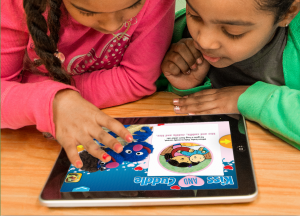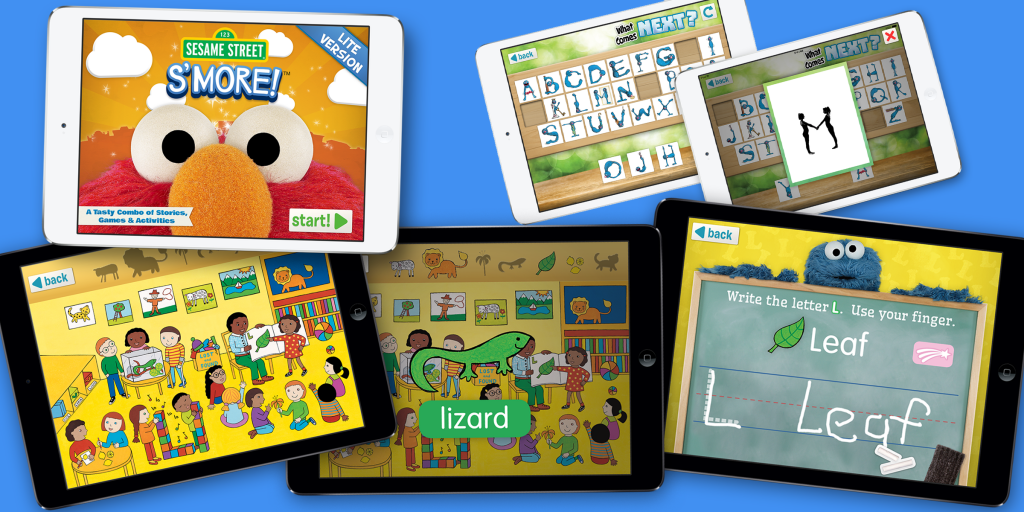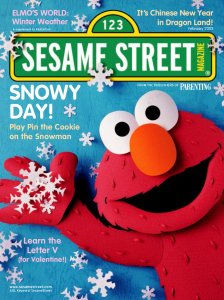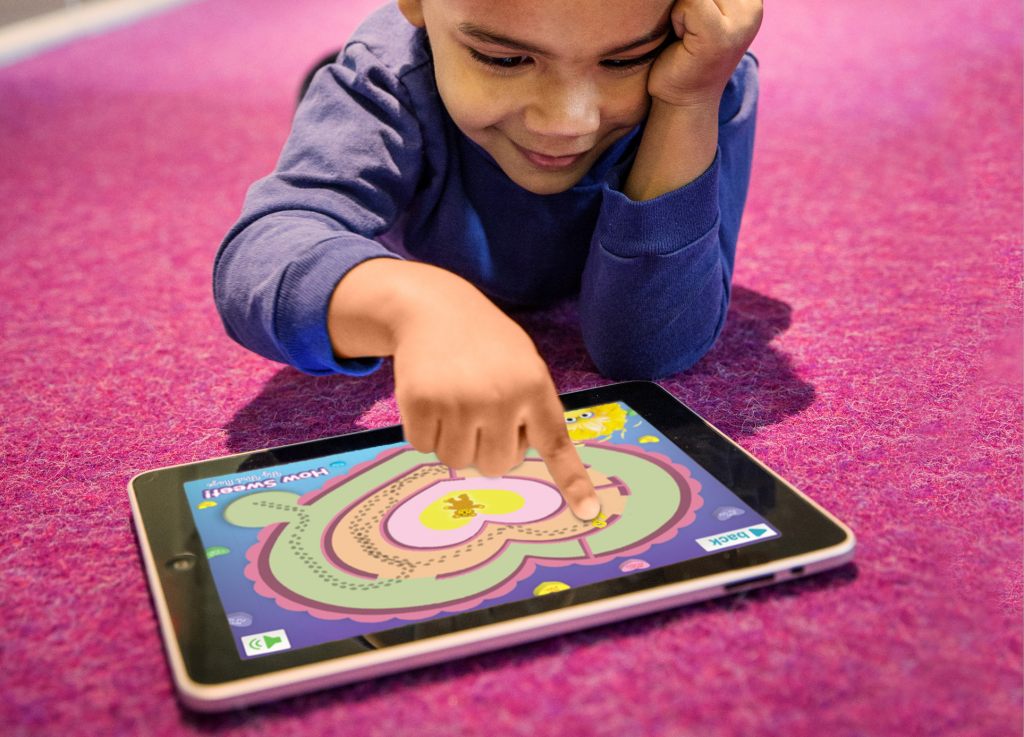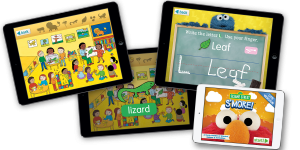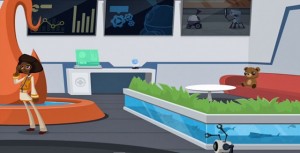Publishing a Digital Magazine for Kids: The Making of Sesame Street’s S’More (Part 2 of 2)
This past spring, our colleagues at Sesame Workshop Publishing launched S’More, a new online magazine for kids 2-5. Last week, we got a look into some of the research that informed their publishing decisions; here, they share a glimpse into the production process.
Technical Development
by Paul Roberts, Manager, Digital Publishing Assets, Fulfillment, & Design, Sesame Workshop Publishing
The traditional process of creating an app is often time-consuming, expensive, and complex: delays and unforeseen costs are commonplace due to changing priorities and schedules, especially when development is in partnership with an outside co-developer. Our main challenge in the development of Sesame Street S’More, Sesame Street’s first digital magazine, was to create an engaging learning app for preschoolers, which would be affordable for families and do-able within our internal budget for new products.
After considering outside independent developer partners for some time, we ultimately decided to take on all development in-house to keep costs down while maintaining creative control as well as the agility to make changes on the fly in response to consumer feedback and potential shifts to business strategy. Sesame Street S’More is the first Sesame Workshop app developed entirely internally.
While there are many tools and platforms available that streamline and simplify the creation of an app, most are quite limited in terms of interactivity and customization. Our goal was to go beyond simply presenting prior Sesame Street Magazine print content in a digital format; the material needed to be updated and re-focused for an interactive and engaging digital application.
After almost two years of research and testing in a rapidly evolving marketplace, we selected the digital publishing system offered by Aquafadas. It offers a robust, cost-effective toolset that enables us to develop, test, and publish the entire app in-house. Anyone with desktop publishing experience can learn the basic workflow since it’s centered on a set of plug-ins to an already well-established desktop publishing system. One of the most appealing things about Aquafadas is that it includes child-focused play patterns so important to our preschool audience, such as coloring pages, mazes, and puzzles, whereas other digital magazine toolsets focus more on functionality appropriate for adults.
With any “off the shelf” system, there are trade-offs regarding the degree to which certain aspects of the app can be customized, or the amount of control over the basic core experience and performance. But most, if not all, concerns are offset by Aquafadas’s affordable price point and capability for rapid development.
Like so much content development at Sesame Workshop, our work on Sesame Street S’More is a work in progress. We have found through testing and advice from our Education & Research team that some of the built-in capabilities of the publishing tool had to be adapted or augmented with HTML games we created ourselves, and we also are constantly experimenting to reduce load times and tweak user experience to make the magazine experience better for our very young audience. Some of our work is influencing changes to the tool itself, so Sesame Street S’More may influence the potential for other apps in the future, built with the same tool by other teams, both inside and beyond Sesame Workshop.
Right now, we continue full-steam ahead, measuring consumer sales against development efficiencies and customer feedback against technical possibilities. The free Sesame Street S’More download is proving to be very popular—it consistently ranks in the Workshop’s Top 5 retail apps in terms of weekly downloads. Since its Apple App Store launch in March 2014, Sesame Street S’More has had approximately 90,000 unique customers. We continue to assess how to convert more customers who enjoy the free “lite” version of the app into paying subscribers, and we are even considering releasing some of our issues as stand-alone apps to broaden the customer base.
The world of apps remains one of innovation on all fronts—content innovation, technological innovation, and even business strategy innovation. With Sesame Street S’More, we are hoping to prove the tried and true “magazine” format can also be innovative. Yes, it can and should draw on all of the traditional activities that are still beneficial for and relevant to a preschooler, but with new capabilities for touch, audio, video, and constant conversation with our consumers to learn how to improve, we think we can continue Sesame Workshop’s longstanding role as a leader in developing enjoyable, skills-based materials for young children using all the tools and technologies available to us.
![]() You can find Sesame Street S’More here: https://itunes.apple.com/us/app/sesame-street-smore!-digital/id797795128?mt=8
You can find Sesame Street S’More here: https://itunes.apple.com/us/app/sesame-street-smore!-digital/id797795128?mt=8
 Paul Roberts is Manger of Digital Assets, Fulfillment, and Design for the Publishing department at Sesame Workshop. In his eight years at the Workshop, he has overseen the development and organization of the department’s digital asset library, which includes over 3,000 titles; designed and created original e-book content; and produced promotional materials, including the Sesame Publishing Catalog. He is currently the technical lead and manages visual design for Sesame Street S’More digital magazine.
Paul Roberts is Manger of Digital Assets, Fulfillment, and Design for the Publishing department at Sesame Workshop. In his eight years at the Workshop, he has overseen the development and organization of the department’s digital asset library, which includes over 3,000 titles; designed and created original e-book content; and produced promotional materials, including the Sesame Publishing Catalog. He is currently the technical lead and manages visual design for Sesame Street S’More digital magazine.
How Teachers Can Use Video Games In The Humanities Classroom
Part 12 of MindShift’s Guide to Games and Learning.
We often think about game-based learning as if video games can become robotic teachers. In the same way that software file systems have created more flexible and efficient file cabinets, we imagine that video games can make great instruction more scalable and accessible. In the same way that email, text messages, and social media have provided more efficient methods of communication, we imagine that digital analytic systems will streamline assessment. These things are true.

Erin Scott
While digital games will certainly never replace a great teacher, they are tools that can help teachers do their jobs more effectively. Just like a shovel works better than digging with only your hands, game-based teaching tools will enable teachers to reach students in ways we can only begin to imagine.
But let’s approach video games in a different way. What if teachers used video games as texts? Let’s think about how we might teach kids to think critically about the underlying messages in commercial games and how we might leverage video games for their ability to engage students and provoke conversation.
At the moment, there’s far too little critical examination of video games happening in school. We take it for granted that we should teach our students how to read books interpretively, how to analyze movies, and how to read the newspaper critically. But all too often we overlook video games as a meaningless triviality.
On the contrary, video games may be indicative of a shift in the way we construct narrative. A good argument could even be made that video games are the new mythology, a kind of non-linear interactive storytelling that shapes the conscious attitudes of today’s youth. Video games might even represent the modern examples of storytelling that will eventually become the classics of literature in hyper-connected centuries to come. After all, nobody could’ve imagined that the novel would be so important to the future of schooling when they read Miguel de Cervantes’ Don Quixote in 1605.
If video games are shaping the conscious attitudes of an entire generation, we need to start asking difficult questions about the kinds of stories we want to tell. These video games are shaping the next generation. These video games are teaching our students how to think about the world, how to make meaning. And we’re letting it happen by accident. That’s crazy. We need help from Humanities teachers.
How can we be more cognizant of the implicit messaging in video games? In my book, FREEPLAY, I try to model a practice and a method of analyzing the underlying psychology of video game narrative. But we need more people to jump on that bandwagon. We need more video game studies departments that are not about game development and computer programming, but rather about critical thinking. Not video game classes that analyze game design and mechanics — video game classes that are about analyzing the literature of gaming. We have film studies, now it’s time for video game studies.
You can start by adding a game to your curriculum. In my undergraduate college classroom, I sometimes require all of my students to play a popular game in the weeks immediately following a unit on Freud. I challenge them to analyze the game like a dream. I ask them to identify the latent content. We identify gender biases, the subtle differences between games aimed at boys and games aimed at girls. What skills are these games teaching? What conceptions of reality are they privileging?
There are also many games that are intentionally created to provoke thought. Some games are designed so that they force us to ask questions. One good example is a game called Republia Times. In the game, you are editor-in-chief of the newspaper in “the free nation of Republia.” Your job is to use your influence to sway public opinion. How much space on the front page do you give to each article? Which items coming over the wire do you ignore? What and how do you deem things newsworthy? You must make quick decisions as stories come into the newsroom. How do the stories impact the readers’ loyalty to the government? You earn points by increasing readership and manufacturing more citizens that are loyal to the state.
This is a simple game that students can play for a few minutes. It’s free and web-based, and works in any browser. You could assign it as homework.
Imagine how this game could fit into a social studies classroom. Imagine the discussion it could inspire about free speech, about how political conversations are framed, about media bias, about political agendas. This is a game that inspires critical thinking rather than rote memorization.
There are many games like The Republia Times, and they belong to a category that’s often called “Social Impact Games.” These are games designed as simulations of real life situations. The mechanics of the game are organized with images and stories in order to make the underlying patterns in our present culture more apparent. They are essentially interactive essays and social commentaries. Or, from a teacher’s perspective, they are simply games that can be used as texts.
The great thing about using video games as a text is that they help to make it clear that the reason I’m writing this series about bringing video games into the classroom is not because game-based learning is some amazing new technique or method for teaching. Instead, the reason we teach in the first place, and the reason to bring video games into the classroom is social impact.
We want to educate students into good citizens for a future world that’s better than the one we live in now. We do that by teaching students to think critically about the world. We do that by teaching them to think about the images, stories and technologies that surround them.
The MindShift Guide to Games and Learning is made possible through the generous support of the Joan Ganz Cooney Center and is a project of the Games and Learning Publishing Council.
Playful Learning and Rigorous Assessment: Can We Level-Up the Common Core?
This piece originally appeared in the Huffington Post.
According to a recent New York Times piece that has stirred a highly emotional debate among my many colleagues, parents across the U.S. who once felt confident helping their children with homework until high school are now feeling helpless when confronted with their first-graders’ Common Core-aligned work sheets. Stoked by viral postings online that ridicule math homework in which students are asked to critique a phantom child’s thinking or engage in complex steps in computational thinking, along with mockery from comedians including Louis C. K. and Stephen Colbert, these parents are now adding their voices to a charged political debate about whether the Common Core is an effective measure of learning or just another way in which Washington is taking over our lives.
At the organization I lead, the Joan Ganz Cooney Center, we’ve recently dipped our toes into the rollicking debate over rigorous standards and accountability systems. While I am personally a keen supporter of creating more rigorous national standards, there are four big challenges that are not getting nearly enough attention in the public debate.
First, the new standards are out of tune with many of the job skills employers are demanding, and won’t fulfill new needs for engaged, healthy problem-solvers in a global age. Traditionally, state level assessments in the U.S. have been focused on discrete and narrow cognitive skills at single points in time and for high stakes. The Common Core State Standards are a major improvement on the breadth vs. depth issue, but it remains to be seen if other key approaches to life-long learning, such as problem-solving, teamwork, tenacity, and healthy habits will be measured by anyone. We should learn lessons from early childhood educators who place emphasis on developing a “whole child” as a key principle of practice. We should also pay closer attention to experts such as Angela Duckworth, the Partnership for Global Learning and CASEL who are experimenting with both classroom and whole school redesigns to promote a new emotionally intelligent, globally oriented youth force, as well as highly promising video game products developed by pioneers such as Trip Hawkins (of Madden Football and FIFA Fame), Richie Davidson, and Debra Lieberman, who are promoting socio-emotional and executive functioning skills and healthy lifestyles in a thoroughly modern way. Bottom line: these leaders are helping schools and youth to build a new skill set that will help kids compete as well as cooperate. They are committed to youth who are smarter, and also stronger and kinder!
Second, the high stakes we’ve come to expect as policy and practice drivers are a real bummer for many kids, teachers, and schools. A better way to frame the national conversation on assessment is to take stock of how many global competitors view assessment as a lever for program improvement. As Henry Roediger recently wrote in the New York Times, testing new learning within the context of regular classwork and study routines has been proven to help students retain new knowledge. In The Smartest Kids in the World, Amanda Ripley suggests that we should build in much more frequent assessments for lower-stakes accountability that is focused on cascading competencies that will then be demonstrated on the higher-stakes and less frequent assessments. The plain fact is that since the link between student and teacher performance is often tied contractually to high-stakes testing, the energies of too many great teachers are being sapped. Another unintended outcome from the high stakes: so many low-achieving youth are turning away from a pathway forward. There are alternatives, like badging systems and more authentic portfolios, that should be prioritized for large-scale experimentation.
Third, the incentives to celebrate success around assessment are currently distorted. While additional pay-for-performance approaches do create incentives for individual teachers to raise student achievement, these schemes do not typically drive additional support to a unit, when academic success is measured–schools as a whole often simply avoid punishment. Simply put, we do a lousy job of rewarding success. Assessments have become a game for individuals and not for the entire learning community.
Enter the prospect of game-based learning as a new element within a more playful, whole-child, community-centered approach. Through the Games and Learning Publishing Council and our new website gamesandlearning.org, a group of national organizations and practitioners is looking at the possible role that digital games, aka video games, may play in documenting and encouraging deeper learning and higher performance. What about games are really good for in learning? Games have driven learning and social communication for millennia. When designed well, they have three great benefits: they are fun to play, they offer tough mental and physical challenges, and they have great social currency–they add to the conversation. Good games allow personalization and rigor, celebrate persistence and grit, and discourage long-term failure. And they offer challenges that a whole school, state or nation can encounter together. Good games give instant feedback and can build community norms for high performance.
Research on games, learning, and healthy development are still in the early stages. With gamesandlearning.org we aim to keep up with the flow of research and investment in this growing sector. For those concerned with assessment, the relevant question is how to reinvent classrooms to meet the needs of today’s students and educators. There is a great deal of evidence that project-based learning approaches that integrate modern technologies are gaining momentum–in strong charter networks such as High Tech High, Rocketship, and Kipp, and in new start-ups such as Quest2Learn and the Incubator School in Los Angeles. These models are often using games and technology to challenge traditional approaches–whether it is flipping classrooms, changing the roles of teachers, or reconfiguring staffing structures to promote success.
New forms of assessment that take advantage of embedded game-based tools may be on the rise. In a recent national survey of K-8 teachers, the Cooney Center found a significant appetite for using games in non-traditional ways. For example, almost 6 out of 10 of the teachers surveyed said that they used built-in assessments in games to make instructional decisions, and over half said that built-in assessment systems helped them judge their students’ mastery of key content at the end-of-curriculum units. Many teachers use what they learn from the games’ assessment tools to modify their own teaching, choosing to emphasize areas where students struggled, and condensing material that they already understand. And nearly half use games to teach supplementary content not mandated by their schools or districts.
Nonetheless, perhaps the biggest (and our fourth) challenge for those interested in game-based assessment as a true driver of performance is in a professional preparation gap: teachers cannot teach with modern tools that they themselves don’t understand. In a previous national survey of teachers that the Cooney Center conducted in 2012, very few had any training in the use of games in the classroom, and more than forty percent pointed to the need for professional development as the most pressing need in integrating new technologies well.
Game-based learning is not a magic elixir to pressing student engagement and performance challenges. But games are an overlooked ally in the fundamental rethinking we must do to ensure that the Common Core and other 21st Century skills are in fact addressed in the next five years. Their unique advantage is the passionate embrace games get from one of the most overlooked success drivers for lasting improvement: the youth themselves!
Merging Past, Present, and Future into So Much S’More: The Making of Sesame Street’s First Digital Magazine (Part 1 of 2)
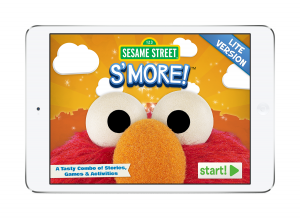 This past spring, our colleagues at Sesame Workshop Publishing launched S’More, a new online magazine for kids 2-5 that is a more interactive experience than a traditional “magazine.” We invited them to share the process with us in a two-part series that looks at the research that informed their publishing decisions here, and next week, a look at the production process.
This past spring, our colleagues at Sesame Workshop Publishing launched S’More, a new online magazine for kids 2-5 that is a more interactive experience than a traditional “magazine.” We invited them to share the process with us in a two-part series that looks at the research that informed their publishing decisions here, and next week, a look at the production process.
Content Development
by Betsy Loredo, Executive Editor & Producer, Sesame Workshop Publishing:
What experience does the word “magazine” define for readers, especially children, today? Just as the world of “grown-up” print is transforming to meet changes in technology and consumer behaviors, Sesame Workshop Publishing must adapt in the same way and re-evaluate our definitions of long-familiar terms, as we create a digital magazine for our audience of families of preschoolers.
Sesame Street Magazine had a long and prestigious history at Sesame Workshop – premiering in 1970, just a year after the TV show debuted. The magazine remained in print, a vigorous extension of the screen experience, until 2002, when the stand-alone issues became an insert in issues of Parenting magazine. After a few years, that licensing relationship ended, and the magazine faded away altogether in 2011.
Much vibrant and still-relevant material existed from those 41 years of magazine content development…was there no way to rejuvenate the magazine that generations of kids had loved? It seemed unlikely at first, at a time when print magazines everywhere, for children and adults, were struggling for their very existence against the competition of digital offerings.
So we began to consider the idea of creating a digital magazine, an app built entirely in-house, adapting existing magazine and other print assets to the new digital arena. This would allow us to be economical in a challenging financial environment, and, just as critically, it would enable us to be highly experimental—to continually test the success, appeal, and learning potential of that interactivity among magazine readers and revise new issues to reflect those audience-based findings.
And so began a two-year deep exploration of the digital magazine environment for kids and experimental app builds of our own. We were aiming for a true transformation of the print experience, where touch and audio would be utilized in ways that a child’s eye and crayon had been used in the old print editions.
A small team of four was formed from the staff of the Publishing Department, which worked closely with the Workshop’s Education & Research team. Together, we developed a prototype – six pages of fully interactive content distributed as a live tablet app to 307 families with children between the ages of 2-5. The test included a week of unsupervised in-home testing and a follow-up survey.
At the time of testing in fall 2012, already 83% of those parents surveyed stated that they used their iPad every day, and 96% reported that their children had experience on the device, with 57% using it by themselves, independent of parent assistance. The majority stated that 10 – 15 minutes was the most time a child would or should spend in a single app in a single visit.
The family study made it clear the time was right for a digital magazine. Parents said the prototype provided an entertaining learning experience. Surprisingly, parents indicated no preference for the old magazine standard of 24 or more pages; instead, they preferred a smaller set of deeply interactive activities. The study also identified specifically what kinds of experiences parents and kids liked best: read-aloud stories, yes, but also art-related activities like coloring and stickers, plus matching and maze games. It also provided a window into how parents thought they wanted the magazine delivered: a collective set of issues delivered inside a single magazine “shell” was preferred to issues purchased individually as stand-alone apps, which added to screen clutter.
And so, Sesame Street’s very first digital magazine was born! After the research, we began active development. Content discussions paralleled business strategy (tablet or phone or both? which distributors? how many issues a year? pricing? develop in-house or with an outside partner?), and about 18 months after the prototype test, Sesame Street S’More launched in March 2014.
Each issue is a rich and fully interactive experience, informed by the Workshop’s 45-years-young “whole child” curriculum. Narrated by one of the show’s human characters and a child voice, all text on screen is spoken, and there are also additional audio prompts and encouraging phrases. Most of each issue’s ten activities include multi-tiered experiences to address the wide spectrum of skills reflected in 2- to 5-year-olds: completing actions unlocks new page levels, badges, and shortcuts. Activities include mazes; puzzles; coloring pages; sticker pages; stories; simple kid-friendly animations; and short, simply animated video…and the all-important character voices. Every issue focuses on a letter and a number and includes parent tips to extend the learning beyond the screen. As with all Sesame Workshop apps, the magazine includes embedded user analytics, allowing us to measure engagement and to extrapolate data about not only appeal but skill-leveling and learning, based on completion rates and badge achievement.
Just before launch came the final hurdle: a name. Once again we had to re-examine the meaning of the word “magazine.” This wasn’t the same Sesame Street Magazine any more. In fact, after a hiatus of several years, we now have two print magazines in the marketplace as well, so how could we let people know this was something new, something different, something more than the print version they’d known in the past? Sesame Street S’More became the clear winner in informal polling compared to many other options. In the parlance of Sesame’s healthy-habits initiative, it implied a fun “sometimes” treat that you didn’t indulge in every day because it was so special. The perfect name for a bi-monthly magazine.
We are now three issues into this new definition of a children’s magazine – hitting quintessential Sesame Street themes of love & friendship, ABCs, and neighborhood, with animals, manners, and Elmo’s birthday issues in the pipeline. We are learning more with each wave of analytics and each new concept and interaction that we tackle. It’s a constant experiment, filled with compromise, adaptation, creative problem-solving, teamwork…many of the skills we support on the show and in the magazine itself.
Now the magazine has to find its audience in an intensely crowded field and newsstand marketplace, where parents might not be looking for preschool content. Is there a home for a digital version of a kids’ magazine in this world of tomorrow? We hope that Sesame Street S’More will help to answer that question and define what the very word “magazine” means in the dawn of this digital age.
![]() You can find Sesame Street S’More here: https://itunes.apple.com/us/app/sesame-street-smore!-digital/id797795128?mt=8
You can find Sesame Street S’More here: https://itunes.apple.com/us/app/sesame-street-smore!-digital/id797795128?mt=8
Come back next week for a peek into the technical development process!
 Betsy Loredo is Executive Editor and an app producer of books and digital experiences involving the Sesame Street characters. She joined Sesame Workshop in 1990 and, in the course of more than two decades with the company, has worked on a wide range of Workshop properties: The Electric Company, Sagwa, Ghostwriter, and Square One. In 2009, she co-wrote and edited Sesame Street – A Celebration, the definitive illustrated history of the show, spanning forty years.
Betsy Loredo is Executive Editor and an app producer of books and digital experiences involving the Sesame Street characters. She joined Sesame Workshop in 1990 and, in the course of more than two decades with the company, has worked on a wide range of Workshop properties: The Electric Company, Sagwa, Ghostwriter, and Square One. In 2009, she co-wrote and edited Sesame Street – A Celebration, the definitive illustrated history of the show, spanning forty years.
Using a Digital Recording Device to Encourage Talk with Children
LENA technology is helping researchers and low-income parents better understand how adult-child conversation affects language and literacy.

Shutterstock
Recent efforts to reduce the “word gap” between affluent and low-income families in Providence, Rhode Island, and Chicago have garnered high-profile headlines and big bucks. Much of the media attention has focused on the technology involved—a tiny recording device and software that help parents and early childhood specialists measure the amounts of talk between parent and child occurring in the home.
The system—known as LENA, for Language ENvironment Analysis—is more than the “word pedometer” it is often termed in news stories. “The key thing we’ve learned over the years is to measure the conversational turns,” said Terry Paul, the man behind LENA’s development. Conversational turns happen when one person says something and the other responds.
A 2009 study by Frederick Zimmerman and colleagues, published in the journal Pediatrics, showed that adult-child conversations were at least as important as adult talk in helping young children acquire language.

This post is part of Seeding Reading, a series of articles and analysis by New America’s Ed Policy Program and the Joan Ganz Cooney Center at Sesame Workshop. See also the Learning Tech section of EdCentral.org and the JGCC blog.
As LENA’s proponent, Paul is a man on a mission to close the achievement gap in language and literacy. Almost 30 years ago, he computerized the paper-based system his wife Judi used to track the books their four children read, creating Accelerated Reader. The Pauls founded Renaissance Learning to market Accelerated Reader and other learning products, and they sold the company in 2011 for $455 million. Although their business was a clear success, their mission remained out of reach. “Our goal was to close the gap and accelerate learning for all students,” Paul said. “I think we were able to help hundreds of thousands of kids become better readers. The problem was, we couldn’t close the gap all the way.”
Paul started digging into research to find the cause of the problem. Around 2001, he read the now-classic 1995 study by researchers Betty Hart and Todd Risley that demonstrated the importance of adult talk with infants and toddlers for later academic success. The study’s authors uncovered a significant word gap between families with lower socioeconomic status and those with higher socioeconomic status. Reading Hart and Risley gave Paul an idea—why not create a device to measure how many words and conversational turns children experience at home each day?

The LENA Digital Language Processor (DLP)
Paul assembled a team of engineers, statisticians, and linguistic experts in automatic speech recognition to develop a recording device and software that would automate the process of recording and coding talk in the home. They designed a 2-ounce recording device, called a digital language processor, which can capture up to 16 hours of audio recording. The device made gathering data much simpler than sending human observers in with tape recorders, as Hart and Risley did.
But the real trick was designing the software. “Some of the people I talked to originally laughed at the idea,” Paul recalled. The chief obstacle was developing automatic speech-recognition software that could work with noisy environments, such as a home with one or more young children. But Paul’s purpose differed from standard speech recognition in an important way: he only wanted to count the numbers of words without having to know what those words were.
“If a human ear can recognize a sound, a computer can, too,” explained Paul. But it took a lot of work to develop the pattern-recognition algorithms that enable a computer to recognize each type of sound that human experts can identify. To create these algorithms, Paul’s team built a supercomputer—with 148 parallel processors—to handle the job, investing six years and $40 million along the way.
Thanks to these algorithms, no human has to listen to a LENA recording. Instead, the recording is fed directly into a computer, where LENA software analyzes it automatically. This saves saves time and ensures the content of the home language recordings stays private. LENA software analyzes three key metrics: the number of adult words spoken, the number of child vocalizations, and the number of conversational turns between adult and child.
Initially Paul thought that mothers who are very focused on their children’s success — often labeled “tiger moms” — would leap at the chance to track their children’s language environments. But they didn’t. “It’s one more thing for a parent to do, especially if they already think they are doing a good job, and most of them are,” he says.
Meanwhile, researchers were excited about the opportunity. In 2009, Paul established the nonprofit LENA Research Foundation to disseminate the tool to the research community. Approximately 200 research groups are currently using LENA to learn more about language acquisition, child development, and supporting language development for children with autism or who have difficulty hearing.
Through their work, LENA is starting to be used with disadvantaged children. University of Chicago pediatric cochlear implant surgeon Dana Suskind discovered Hart and Risley’s research and LENA when searching for the cause of disparities in language acquisition among her post-implant patients. Her intervention programs, Project ASPIRE (for disadvantaged children with hearing loss) and the Thirty Million Words initiative, use LENA to help parents track their words and conversational turns with their babies and young children. (Watch for more information on Thirty Million Words in an upcoming post.)
The real impact of LENA, however, is still to be determined. Some early childhood experts have expressed concern that the technology will put too much of a focus on quantity over quality, or that it will not address the underlying reasons that some parents are unable to or unaccustomed to talking with their children. “The device has no idea which words are being used; it can only estimate the total count of words,” said James Morgan, a professor of linguistics at Brown University, in an interview with PBS NewsHour.
Suskind’s preliminary randomized, control trial with a small sample of 23 parents using Thirty Million Words’ home-visiting curriculum for eight weeks showed that LENA feedback could help low-income mothers increase their talk to, and conversational back and forths with, their children. The impacts diminished with time, however. More research is underway. Paul credits Suskind with introducing LENA to Providence Talks, an effort launched by Rhode Island’s most populous city in February to help interested parents enrich their young children’s language environment with more conversation, reading aloud, and other best practices.
At New America, we wrote about LENA and the start of the Providence Talks project in this blog post and article in TIME. Also exploring the project: National Public Radio and PBS NewsHour in this recent segment that describes the pros and cons of the project.
Maureen Kelleher is a freelance writer in Chicago. She covers early childhood and digital learning for HiredPen Inc
From Mars to Minecraft: Teachers Bring the Arcade to the Classroom
Part 11 of MindShift’s Guide to Games and Learning.
Teachers have found many different ways of using digital games in the classroom. But what kind of games are these students playing? And how are teachers incorporating them in the classroom?
Last year’s report from the Joan Ganz Cooney Center, “Games For A Digital Age,” made the distinction between “short-form” and “long-form” learning games. Short-form games are designed to be played during a single class period. “They focus on a particular concept of skill refinement, skills practice, memorization, or performing specific drills.” Long-form games “extend beyond a single class period” and sometimes gameplay can “spread over multiple sessions or even several weeks.”
Often long-form games are comprehensively tied to a full curriculum. They can replace textbooks by offering an interactive experience that seamlessly blends content, practice, and assessment into a contextualized learning experience. While some programs like this already exist, it’s difficult to implement well. For teachers who want to get started, short-term games can supplement their already established curricula with fresh and engaging activities.
Learning Games
Some games are designed to do just that. Consider Mars Generation One: Argubot Academy. Designed by GlassLab, in collaboration with NASA, the game is aligned with Common Core ELA standards and infused with STEM content. It focuses on teaching argumentation, and in particular, it focuses on how to use evidence to support claims.
Mars Generation One: Argubot Academy is a role playing game that combines a space-age storyline about building a Mars colony with great animations. It engages students in a topic that is often hard to contextualize. While we ordinarily demand that students demonstrate argumentation skills in expository writing, modern education practices rarely approach it in such an explicit way.
“By teaching ELA standards through a STEM-themed storyline, the game is fundamentally interdisciplinary in all the right ways,” wrote Patricia Monticello Kievlan, a San Francisco classroom teacher who reviewed the game for Graphite. “Showing students how these skills bridge disciplines is a critical lesson, and that point is deftly delivered.”
Argubot Academy is a great short-form tablet game that many teachers use to add contextualized interactive practice to your existing ELA curriculum (grades 6-8). John Paul Sellars, a fifth grade teacher who used the game during this past year at Red Bank Elementary School in Lexington, South Carolina, says his students “loved the ability to combine gaming with their learning.”
Classroom Modifications
Teachers are also using commercial games that have been modified for classroom use. Perhaps the most famous is MinecraftEDU. This classroom-ready modification of the popular sandbox game is not only less expensive than the commercial version, it also provides many tools that empower teachers with the ability to adapt gameplay to established class curricula.
Joel Levin, one of the creators of MinecraftEDU, uses it with second graders. But it works with students of any age. What makes MinecraftEDU great for teachers is the same thing that makes it so popular among gamers: it is so open-ended that that the possibilities are only limited by your imagination. Search the web and you’ll find thousands of examples of teachers using MinecraftEDU.
MinecraftEDU provides a virtual world where teachers and students can build simulations with unlimited resources. When I was a student, we held mini-Renaissance Faires and built toothpick bridges. We were always limited by time, space, and resources. In today’s Minecraft-equipped classrooms, both teachers and students build entire multi-player worlds full of interactive scenarios. For example, when I visited the Quest to Learn school in NYC at the end of their school year, I saw final projects that used Minecraft in their presentations. One class used Minecraft-polar-ice blocks to model the potential impact of global warming. Another demonstrated their understanding of urban water treatment and sewage engineering by building a working system out of pixelated blocks and then simulating rainfall and flooding.
Commercial Games
Most teachers and parents are on board with games that are manufactured or modified for educational purposes. But what about big, bloody, shoot-’em-up commercial games? Could they also be put to use in a classroom?
Consider Norwegian high school teacher Tobias Staaby. He’s a relative newbie in the classroom. But it may actually be to his advantage that he’s only been teaching for two years; he doesn’t feel like he’s got it figured out yet. “I’m constantly searching for new ways to improve my classes, and to engage and motivate my students,” he says. One thing that has worked is using zombie-themed video games to teach moral philosophy and ethical theories. “I was looking for a way to make these concepts easier to understand without oversimplifying the material.”
One of the hardest things about facilitating class discussions about ethics is presenting engaging dilemmas that they haven’t “necessarily thought or heard much about, thus making their arguments and decisions much more their own.” Staaby settled on using The Walking Dead video game by Telltale Games.
Loaded on his personal laptop and streamed through the classroom projector, Staaby boots up The Walking Dead and hands the controller to a student. The rest of the class shouts commands at the player. Then, whenever the game presents an ethical dilemma, they “pause the game and discuss the next course of action using the ethical models and theories they had learned earlier that year — relational ethics, consequential ethics, ethics of virtue, and ethics of duty — as a basis for their arguments.” What started as Staaby’s spontaneous unplanned class exercise quickly evolved into a rigorous project. He now prepares short lectures and ties ethical theories to specific dilemmas within the game. (More about Staaby and his school in a soon-to-be-published MindShift article.)
There is research to support Staaby’s intuitive findings. A recent study out of the University at Buffalo Department of Communication, Michigan State University, and the University of Texas, Austin says that playing violent video games may increase moral awareness. “Our findings suggest that emotional experiences evoked by media exposure can increase the intuitive foundations upon which human beings make moral judgments.” Says Matthew Grizzard, one of the study’s authors. Imagine it like a low stakes practice run; simulated opportunities to practice moral and ethical decision making can teach individuals to iterate their initial reactions and make better choices in the future.
In Jerome and Donna Allender’s new book Ethics for the Young Mind: A Guide for Teachers and Parents of Children Becoming Adolescents, they write about the importance and challenges involved in teaching ethics. Their work reminds us that it all comes down to considering “responses to otherness.” When the bell rings at the end of the day, isn’t this what school is all about? We not only want to raise caring individuals, but we also want to provide our students with the skills necessary to maintain fulfilled work-a-day lives. Becoming an ethical person requires “learning more about connecting with others in ways that satisfy our needs and wants while attending to those of others.”
The common attribute of all effective learning games is that they simulate systems. They teach students how to understand academic concepts in relationship to the world around them. Certainly this increases engagement and retention, but what really matters is that it is about using knowledge in an inter-disciplinary way.
Digital or analog, game-based or not, good teaching and learning is about building social awareness, considering the individual’s impact on a wider world.
The MindShift Guide to Games and Learning is made possible through the generous support of the Joan Ganz Cooney Center and is a project of the Games and Learning Publishing Council.
Kids Need Truly Interactive Experiences
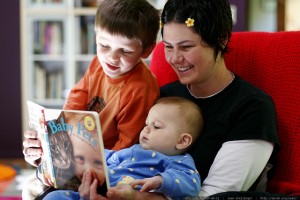
Flickr/ Sean Dreilinger
“Interactive” is one of the most overused words in the 21st Century, a label attached to thousands of digital devices, apps and TV shows for kids. Interactive tablet apps will read a book to your kid and interactive cartoon characters will invite your kid to dance during a TV show.
The word “interactive” can make anything sound more educational. But what does it mean, really? Digital devices generally provide solitary experiences for kids, but these tools are marketed to parents as “interactive.”
Merriam-Webster offers two definitions of “interactive.” The first is something “designed to respond to the actions, commands, etc., of a user.” The vast majority of apps and digital materials meet this definition, interacting with kids in unique ways. But the kids are all alone during these experiences.
The second definition of “interactive” is any activity “requiring people to talk with each other or do things together.” This is the crucial kind of experience that our kids need now.
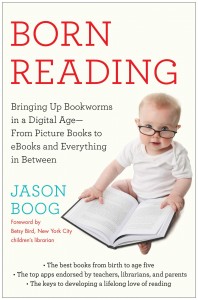 I wrote Born Reading: Bringing Up Bookworms in a Digital Age to guide parents through these earliest reading years. My book illustrates the art of “interactive reading,” simple techniques developed by experts over the last 25 years to maximize the benefits of reading aloud to a child.
I wrote Born Reading: Bringing Up Bookworms in a Digital Age to guide parents through these earliest reading years. My book illustrates the art of “interactive reading,” simple techniques developed by experts over the last 25 years to maximize the benefits of reading aloud to a child.
My book details 15 different interactive reading techniques, but some of my favorite questions work with any kind of media experience: Have you ever felt like that character? Why did that character do that? Who is your favorite character? What do you think will happen next?
Research has proven over and over that this invaluable interaction between child and caregiver can make kids smarter. You can read more on my site and watch videos about these interactive reading techniques at my site.
“Interactive” apps, e-books and other digital tools threaten to destroy the art of interactive reading. Nothing can replace the experience of a child reading with a parent or caregiver—not even the best “interactive” materials.
We don’t need to stop using digital devices with children, but we need to make sure these experiences are truly interactive. Apps, e-books and even television time can all be improved when a caregiver participates in the process. No matter what kind of media you use with a child, ask them questions to help them process the experience.
You can turn anything into an interactive experience by creating what I call “Born Reading Bundles”—reading experiences that combine materials across media boundaries. You can dance to related music, visit the library to find more or pretend to be characters in a book.
The key is that a parent or caregiver helps the child follow their interests and explore new stories. For instance, my daughter loved Disney’s Frozen, so I built a Born Reading Bundle of material related to the hit movie.
21st Century parents will struggle every single day to model healthy digital and print reading habits, but it all begins with these shared reading experiences. Our kids’ future depends on it.
Instead of loading your tablet or smartphone with apps that give your child a passive and solitary experience, I made a list of apps that require a parent or caregiver to participate in the process. These apps are truly interactive!
Grow a Reader: Created by the Calgary Public Library, this free app includes book recommendations and videos illustrating lullabies, games, rhymes and other interactive techniques. You can master the five fundamentals of childhood interactivity: sing, talk, play, read and write.
https://itunes.apple.com/us/app/id594398910?mt=8&ign-mpt=uo%3D4
Story Kit: This free app will let your child take smartphone pictures and arrange them into a simple digital book to share with family and friends. Your child can draw, write and record their voice with the app. It is the perfect way to show your child how to use your smartphone as a tool, rather than a toy.
https://itunes.apple.com/us/app/storykit/id329374595?mt=8
Sesame Street Family Play: This innovative app comes in handy during long road trips, restaurant waits or rainy afternoons. Instead of letting your kid play passively on your smartphone, this app will teach both the adult and child a new game to play TOGETHER. But these aren’t video games, these are simple games you can play with the things around you: paper, pens, socks, shoes or balls.
https://itunes.apple.com/us/app/sesame-street-family-play/id690979001?mt=8
Felt Board: Kids can customize figures on a virtual felt board, telling simple stories and sharing pictures. With a little help from a parent or caregiver, kids can really unlock the potential in this storytelling tool.
http://www.amazon.com/Software-Smoothie-Felt-Board/dp/B007PUU7M4https://itunes.apple.com/us/app/felt-board/id492342753?mt=8
Toontastic: This app lets kids use digital puppets to tell a story. They can choose from a variety of settings, characters and special effects. With the help of a parent, they can record their voices and move the puppets around the screen—recording their own stories. In a few short minutes, parents and kids can produce their own movie.
https://itunes.apple.com/us/app/toontastic/id404693282?mt=8
Pigeon Presents: Mo on the Go: This app encourages your kid to dance, scribble and create photo stories—all using beloved characters created by Mo Willems (one of the writers interviewed in my book). Instead of a passive experience, the app encourages kids to involve parents or caregivers in the playful app.
https://itunes.apple.com/us/app/pigeon-presents-mo…-on-go!/id593697686?mt=8
 Jason Boog spent five years as the editor of Mediabistro’s publishing blog, GalleyCat. His writing has appeared at NPR Books, the Los Angeles Review of Books, The Believer, Peace Corps Writers, and Salon.
Jason Boog spent five years as the editor of Mediabistro’s publishing blog, GalleyCat. His writing has appeared at NPR Books, the Los Angeles Review of Books, The Believer, Peace Corps Writers, and Salon.
Q-and-A with Alexis Lauricella on Parenting Texts and Language Development
Can text messages to low-income parents help close the word gap? It’s not an idle question. Last month, the advocacy group Too Small to Fail announced plans to experiment with text messages to parents in a new partnership with Kaiser Permanente, Sesame Workshop,* and Text4Baby. In a recent blog post for Seeding Reading we reported on an initiative called Parent University that sends text messages to Head Start parents with suggestions for building literacy skills in their children. (We also reported on parents’ reactions to the project.)
A study of Parent University, which is administered in partnership with Chicago’s Ounce of Prevention Fund, was led last year by Northwestern University’s Ellen Wartella and Alexis Lauricella. In this post, Barbara Ray interviews Lauricella to glean insights into what worked and why.
Barbara Ray: You find that the program was effective with boys and dads. Was that surprising?
Alexis Lauricella: In hindsight, it makes sense that the service may have been particularly effective for parents of boys and dads. Past research suggests that young boys engage in more challenging behaviors (e.g., aggression) and, accordingly, their parents may be in need of greater support. Also, fathers and parents of boys are less likely to endorse or engage children in complex social-based activities like pretend play, and the texts may have prompted these parents to engage in behavior that might not otherwise have been top-of-mind for them.
Why are these findings encouraging for the program? Is it rare to find these kinds of effects in six weeks, for example?

This post is part of Seeding Reading, series of articles and analysis by New America’s Ed Policy Program and the Joan Ganz Cooney Center at Sesame Workshop. See also the Learning Tech section of EdCentral.org and the JGCC blog.
These findings are encouraging for three reasons: First, six weeks is a relatively short time period for an intervention, so seeing results from a basic text intervention so quickly is definitely encouraging. Second, this population is somewhat unique in that they were all associated with Head Start centers, which already are highly involved with and supportive of parents. Therefore, to find an additional benefit to a group of parents who were already high on parent engagement and involvement was also very exciting. Finally, text messaging is ubiquitous and relatively inexpensive, and our results suggest that providing parents with content and information via a text message program may be a promising way to communicate with them.
Any things we should be cautious about when interpreting these effects?
Like any intervention, you want to be cautious of generalizing findings from one population to other audiences. As I mentioned, these were parents from Head Start centers, which offer a range of supports that vary from other types of child care centers. Further, we are excited about the findings regarding fathers, but we did have a smaller sample of fathers than mothers, and this finding should be replicated with more participants to ensure its reliability. Additionally, future research should assess if the kinds of behavior changes we noticed in our study are sustained or become more pronounced in the long term.
What was the most surprising finding for you?
What was most surprising is that something as simple as a 140-word text message, sent five days a week, was able to influence parenting behaviors and that the parents were so grateful and excited about the service!
What about going to scale with the program? Many programs have trouble when they’re implemented in more sites because people don’t follow the same script or they modify the program, for example. Is this kind of program, because of the texts and the way it is designed, more likely to skirt issues of fidelity when going to scale?
I think this type of program could easily be implemented and applied to a larger audience. Because it is focused on a particular age group, it is specific enough to be useful to parents while still being broad enough to potentially appeal to a wide population of parents. In our study, all messages were written in advance of the study and “pushed” to parents via an automated service. Thus, having larger numbers of parents receive similar automated messages wouldn’t pose fidelity issues. I think the initial sign-up for the service may be the biggest struggle as people aren’t sure they will like it and may not be excited to participate without the involvement or support of their school or parenting network.
Anything else that is unique or interesting about the program?
The service was unique in that it did not just promote one type of activity (i.e., literacy-based activities) but rather provided a wide variety of suggestions across multiple topic areas, along with messages intended to provide socio-emotional support to parents. Most other texting interventions we’re aware of have focused on a narrower range of target behaviors or goals. It would be interesting to see if a service with a more narrow focus would produce stronger effects in that domain, or if parents respond better to a service like the one we tested that touched upon many topics.
And, more and more parents these days use smartphones. Indeed, about four-fifths of the Head Start parents in our sample own smartphones. It would be interesting to see a study replicate our findings with an app that could deliver push messages at times requested by parents or that could allow parents (and researchers and service providers) to track their parenting behaviors or their children’s learning.
*Full disclosure: The Joan Ganz Cooney Center at Sesame Workshop is a partner with New America on the Seeding Reading project of which this post is a part.
Barbara E. Ray, is a writer and editor living in Chicago, and owner of Hiredpen, Inc. She was the communications director for the MacArthur Research Network on Transitions to Adulthood, and has held positions as senior writer at the DHHS-funded Joint Center for Poverty Research, and as a managing editor at the University of Chicago Press journals division.
Parent Voices: Doubts, then Excitement on Texts to Promote Literacy
When Alexiss Evans enrolled in the Ounce of Prevention Fund’s Parent University literacy program, she did so because she believed in the organization and because she wanted to give her daughter every possible opportunity to learn. “I’m one of those parents who, if [the Ounce says] something, I’ll do it,” she said. “I want to show support and be a team player.”

Text messages can prompt parents to engage in literacy activities with their children, while providing encouragement and empathy. Flickr: Leon Fishman
Evans received text messages each weekday for six weeks. These texts suggested activities for Evans to do with her 5-year-old daughter, from playing “I spy” with letter sounds to making an alphabet chart. They also offered general words of encouragement and empathy for parents, like “After you put the kids to bed take a few moments to have some alone time. You deserve it!”
However, Evans admitted, she mostly ignored the messages for the first few days. Like many of the Head Start parents surveyed in a Northwestern University study of the program, she wasn’t convinced that texts are a good way to receive parenting information. [For more on the Northwestern study, see this post and this Q-and-A.]
Then she was having a bad day and received a text from the Parent University with an encouraging message: “Hey mom & dad, we wanted to take a second to tell u what an awesome job ur doing!”

This post is part of Seeding Reading, series of articles and analysis by New America’s Ed Policy Program and the Joan Ganz Cooney Center at Sesame Workshop. See also the Learning Tech section of EdCentral.org and the JGCC blog.
It was exactly what she needed to hear. “That’s when I started doing them every day,” she explained.
Her daughter Alissa caught on soon after and started looking forward to the texts, which arrived at the same time each day. “When I started getting messages, I would open them and read them out loud,” Evans said. “She would say, ‘Well, can we do that? What does it mean?’”
Evans appreciated that the texts helped her daughter work on critical literacy skills in different ways from traditional learning. “I felt like I was fooling her,” Evans remarked. “She loved it. You would have thought I was giving her a trip to the carnival.”
By the end of the program, Evans was among the 91 percent of intervention group participants who agreed that sending parenting tips via text was a good way to receive parenting information.
This change of heart among parents would come as no surprise to behavioral economists, who understand the importance of that little nudge in the right direction. In their book, “Nudge: Improving Decisions About Health, Wealth, and Happiness,” authors Richard Thaler and Cass Sunstein suggest that decisions aren’t made in a vacuum. Rather, a complex mix of both conscious and subconscious factors influences every decision we make.
Consider, for example, how the design of a school cafeteria affects students’ food choices—either positively or negatively. When nutritious food is displayed prominently at eye level, students tend to eat healthier. When junk food is more readily accessible, that’s what students reach for first. Notably, in the first scenario, the junk food hasn’t been removed from the cafeteria. But it’s presented as a choice, albeit a slightly more difficult one.
Thaler and Sunstein coined the term “choice architects” to describe people who direct others toward particular decisions. Their book advocates for a type of “libertarian paternalism” that guides people toward making better choices. The Obama Administration began applying the economists’ ideas to human services in 2010 with the launch of the Behavioral Interventions to Advance Self-Sufficiency (BIAS) program. A new lab at the University of Chicago will begin applying behavioral insights to early childhood development and parenting.
The Parent University program works similarly—but in this case the nudge toward a better choice is in the form of a vibrating text message inviting parents to engage in bonding and literacy-promoting activities with one’s child. Many parents fully intend to read to their child, but by the end of the day, the good intentions go out the door with “decision fatigue”—after a day of making hard choices, our stock of self-control is depleted. Even a minor inconvenience seems like too much of a hurdle. A buzzing text message with some easy instruction is just what many parents need.
And it’s delivered on a device most parents have with them at all times. Yes, that goes for low-income parents as well. According to a Pew Research Center study, 84 percent of Americans with an annual household income less than $30,000 have a cell phone of some kind. That’s only slightly fewer than the 90 percent of all American adults who now have cell phones.
The program aligns closely with the Ounce’s mission to close the early achievement gap by supporting the parent-child relationship as the foundation for all learning. “Our parents don’t have very much time or resources,” says Ann Hanson, manager of research and policy initiatives at the Ounce. “Those everyday moments of learning or interaction are critical. We’re turning that ordinary moment into a learning experience.”
For Evans, those small nudges had a lasting impact. She would reread texts days or even weeks after they were sent. “Even if I didn’t take advantage [of the advice] necessarily that day, I went back on the weekends and said, ‘We can do this, this, and this,’” she said. “It was still there, and I could come back to it when I did have that particular fruit [that was needed for an activity] or went grocery shopping and could pull up the messages.”
Evans’ partner, Brandon Jones, agreed that the texts resulted in more hands-on family activities. Although the text messages went to Evans’ phone, Jones would see Evans and Alissa, for example, creating collages or making shapes with pasta, and he would join the fun. Call it a nudge by association.
Program participant Camille Curry was already in the habit of Googling activities to keep her then-4-year-old son Ashton occupied. A busy single parent of an only child, Curry said she initially doubted whether a complete stranger could come up with suggestions that would engage his curiosity. But the texts won her over, and she says she appreciated the help and suggestions.
“What really stands out to me is how a text said to take the ‘Little Red Riding Hood’ story and have a real conversation with my son about stranger danger. ‘What did she do that you shouldn’t do? And how could she have gone about not talking to strangers?’” she said. “I wouldn’t have thought to use that book to teach stranger danger.”
However, the messages she claimed were most helpful concerned self-care and relaxation—for parents. She enjoyed mindfulness exercise in particular, which instructed her to tighten all her muscles and then gradually relax them. She still does that one.
In addition, the texts’ simplicity appealed to Curry. “It doesn’t take much,” she stated. “It’s a small suggestion, and it’s free. I didn’t have to go buy anything. That’s what I really enjoyed.”
Heidi Moore is a writer and editor in Chicago. She covers education, housing, and digital media and learning for HiredPen Inc.
Games Can Advance Education: A Conversation With James Paul Gee
Part 10 of MindShift’s Guide to Games and Learning.
Most people involved with games and learning are familiar with the work of James Paul Gee. A researcher in the field of theoretical linguistics, he argues for the consideration of multiple kinds of literacy. The notion of “New Literacies” expands the conception of literacy beyond books and reading to include visual symbols and other types of representation made possible through, among other things, current digital technologies.
At this point in the evolution of education, it’s critical that we expand our conception of literacy to include more than just words. In fact, we may need to reimagine how we nurture early literacy to make sure we provide a foundation not only for reading, but also for “New Literacies.”
Gee is included in this series because outside of academic psycholinguistics circles, he’s especially well known for his work on video games. He’s written and edited many books on game-based learning and education. He’s influenced countless game designers and educators. Some of his theories have provided the foundation for many of the ideas I’ve covered in this series, especially those having to do with systems thinking.
In the following conversation with Gee, we discuss literacy, systems thinking, education, socio-economic inequality, and, of course, video games.
Jordan Shapiro: Your book, What Video Games Have to Teach Us About Learning and Literacy, is a classic in games and learning circles. It is rare that I meet a game developer who doesn’t mention it. Did you expect it to have such a big impact when you wrote it?
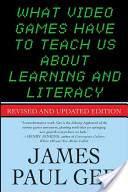 James Paul Gee: No, I did not expect such a big impact. I wrote the book because my then six-year-old’s gaming turned me on to try an adult game. I had never played video games before.
James Paul Gee: No, I did not expect such a big impact. I wrote the book because my then six-year-old’s gaming turned me on to try an adult game. I had never played video games before.
I was, at first, truly amazed by how hard and long they were. To learn to play them well required a great deal of persistence past failure. Eventually, I loved playing games and realized that if I did not write about them I would not have an academic career anymore.
JS: One of key concepts in the book is that literacy is about more than just reading words. I find that it is a bit of a leap for people who aren’t familiar with linguistics to grasp that idea. These days we talk about “digital literacy” and “financial literacy” as if it just means “competency.” But it is more complicated than that. Can you briefly explain how literacy and systems thinking are related?
JG: The human brain devotes only one special function to reading (namely, decoding sounds into letters and vice-versa). Otherwise, all the mental capacities that we use to understand and give meaning to print are the very same ones we use to understand and give meaning to oral language and to the world.
Current work on the mind argues that words gain meaning from experiences we have had in the world. We use our previous experiences to build simulations (images and actions) that we attach to words to assign them contextually appropriate meanings.
In a sense, then, video games are like an external version of the mind. When we understand things and plan actions we run game-like role-playing simulations in our heads. In a sense, our mind is a game engine. We can combine elements from disparate experiences and create fantasies and think through complex problems.
System thinking involves being able to think in terms of complex interacting variables that make a system more than the sum of its parts. We most certainly want to see much of the social and natural world in these terms, since being stupid about systems (e.g., global warming) can lead to nasty unintended consequences.
Video games are complex systems composed of rules that interact. Gamers must think like a designer and form hypotheses about how the rules interact so they can accomplish goals and even bring about emergent results. Thinking like a designer in order to understand systems is a core 21st Century skill.
JS: Okay, so systems thinking is related to literacy, but certainly playing video games won’t teach kids how to read books, will it? In fact, the way you’re talking about literacy, it applies to more than just the language arts. And thinking in this way about literacy makes it easy to see that STEM and ELA are fundamentally both just semiotic systems. Why is this concept so important to the future of education?
JG: Understanding oral and written language involves essentially running video-game like simulations in our heads. We run problem-based simulations where we try out various actions in our heads (as ourselves or someone else) and gauge their possible consequences.
A game manual is given meaning by the game world it is about, not by a dictionary. A physics textbook is a “game manual” for the actions, experiences, and problem solving that physicists engage in. The textbook, too, is given meaning by the “game” and the world it is played in (a somewhat different world than our everyday world, since physicists, thanks to their tools, can see things like electrons).
In school, we give people texts when they have not had enough experience in the worlds the texts are about, the experiences that give the texts meaning. It is as if we were to give kids game manuals without the games. It only works for kids who are getting a lot of experiences at home—backed up by lots of talk with adults about these experiences, talk which helps the kids learn to map language on to experience and vice-versa—but it is disastrous for less advantaged kids.
Whether it is STEM or ELA, if we do not deliver the game, but only the text, we do not get problem solvers and system thinkers, we get, at best, paper-and-pencil test passers.
JS: Clearly, you’re not just proposing that we throw video games into the existing educational landscape willy nilly, are you? It is not that games are going to improve test scores or content retention. You’re suggesting we need to fundamentally change the way we think about learning–or at least the way we think about what and how we TEACH. Can you explain?
JG: Yes and Amen. Games can be used—like any other technology—to instantiate the current paradigm of mindless testing, punitive accountability, and fact-based education untied to thinking or problem solving. However, this is like using a machine gun to kill an ant.
Games and other related technologies—together of course with talk and texts—have the potential to radically change the paradigm and unless we do change the paradigm they will just be co-opted by the current grammar of schooling.
Schools today contribute to our massive inequality by providing (some of) the rich with a good education and the poor with test-prep to fit them for future service jobs. In the face of making profit and competing with near monopolies, it is easy to sell out and become part of the problem and not part of the solution.
There is a reason why the great game heroes we love (e.g., Solid Snake, Gordon Freeman, Lara Croft, Mario) don’t wear suits.
JS: It seems to me, then, that your message is more about learning from games than it is about using games. Am I correct? Your (and my) vision of a utopian school doesn’t look like a video game convention full of kids clutching joysticks. So, if you had to pick one primary way of thinking about learning/teaching that our schools should appropriate from video game developers–the big soundbite takeaway–what would it be?
JG: I want to bring rich, well-mentored, well-designed learning systems to school. These systems would connect digital tools, other technologies, interactions, talk, and text (each being used for what they are best for) to marry experience and language in the name of problem-solving and design thinking.
JS: Still, video games can be one tool that’s used in the classroom, right? It is possible to design really impactful game-based learning platforms, isn’t it? In addition to the lessons we can learn about education from video games, do you think we should continue to integrate games into some parts of the school curricula?
JG: Of course. But I am against any one tool (think textbook) being used for everything. I want all the best tools we have used in concert with each other to create collective intelligence. I want tools to be recruited in a learning system to do the jobs for which they are best fitted (which might be different in differently designed learning systems).
For example, games are often good for preparation for future learning, motivation, and getting lots of practice in core skills and concepts at an experiential level. They can be good, as well, at helping learners to form non-cognitive skills like passion-fueled persistence past failure in the name of copious deliberate (thoughtful, strategic) practice.
JS: How about on a practical everyday level? Teachers are operating within an environment that you’ve called a “toxic mess.” They might change the way they think about education and literacy, but actually changing the way they teach is a much bigger challenge. Parents and politicians say they want to fix education, but they stubbornly resist anything that looks like a paradigm shift. Do you have any suggestions for how teachers might begin to make incremental changes within a maddening infrastructure?
JG: The goal is not to make the prison better, it is to let the prisoners (students and teachers) free. Our society today is a mess. We have the highest level of inequality we have ever had. We readily ignore and even disdain evidence (e.g., global warming, evolution). We have a casino capitalism unmoored from productivity or social good. School reform has very little to do with schools.
There are no other silver bullets. The problem of making school good for everyone is one of having the social will to gain more equality in our society, to honor more than money and status, and to give everyone the right to be a producer and participant–not just a consumer and spectator.
We keep talking about schools and teachers, because we do not want to talk about society, ourselves, and the craven way we have empowered the rich, corporations, and rampant social Darwinism. We cannot change our society in one fell swoop.
Sneak in, move quietly, attack unseen, put away the suit—be a snake.
JS: In your most recent book, The Anti-Education Era: Creating Smarter Students Through Digital Learning, you express a lot of concern about how technology is integrated into schools. What is it that worries you?
JG: What worries me is the way in which we in the United States have enshrined human stupidity. In an age where interacting complex systems are killing us with the consequences of greed and stupidity, we regularly disdain evidence and honor ideology. Lots of Americans believe the Earth is about 6000 years old, do not believe in evolution, and think that Christianity was about wealth and a form of social Darwinism.
For me, evidence means trying to do something in the world (as an everyday person or a scientist) and paying close and respectful attention to how the world responds to our “probe.” Is its response good for our goals or should we rethink and act again in a new way? When we disrespect the world, the world bites back and, boy, is it biting back now.
Our current situation is now too dire and the complexity of the world is now too great for us to any longer rely on traditional silo-based notions of expertise (look what Alan Greenspan did to the global economy).
We need collective intelligence where we view humans, in mind and body, as plug and play devices that get smart only when they are plugged into good tools, good people, and good practices in the service of pooling knowledge and diversity to make the world a better place. Games like Foldit or things like Galaxy Zoo are already interesting beginnings here. Digital and social media can niche our silos into pure echo chambers or they can create worlds of new experiences and possibilities.
JS: What do parents and educators need to know about the future of education and the future of game-based learning? Some things about edtech are inevitable, are there places where we need to be especially mindful?
JG: When I say in talks that Armageddon is upon us, people laugh and dismiss the claim as far-fetched. But the reality is Armageddon has already come for untold millions of people in the world who are starving and dying as the consequences of global warming, the global economy, and conflicts over resources.
It is clear from massive amounts of research that while we cannot predict what will happen in the future—because we have created a swarm of black swans due our greed and stupidity—we can say it will be a time of great change and transformation.
People and institutions will have to be resilient and change with change. They will have to gain very real skills with critical thinking and complexity in order not to be dupes and victims of the rich, corporations, media, and governments. They must become activists, knowers, producers, and participants and plug into and play with right team of people and tools.
This requires ethical thinking and a vision for a better world. People must become proactive, deliberate learners in and out of school and for their lifetimes. Good parents and good teachers must mentor them to be such deliberate, strategic, and ethical learners. Then people will face the future as gamers gaming systems to mod our world.
JS: Anything else you want to say that I haven’t asked you about?
JG: Don’t trust people in suits who don’t game.
